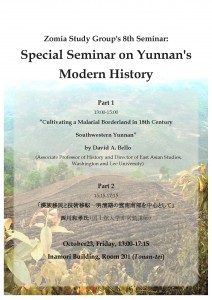
- このイベントは終了しました。
第8回「ゾミア研究会」
2015/10/23 @ 1:00 PM - 5:15 PM
イベント ナビゲーション

日 時:2015年10月23日(金) 13:00- 17:15
会 場:京都大学東南アジア研究所稲盛財団記念館2階201号室(東南亭)/ Tonan-tei (Room 201), Inamori Foundation Memorial Building, Kyoto University
プログラム:
13:00~15:00
”Cultivating a Malarial Borderland in 18th Century Southwestern Yunnan”
by David A. Bello (Associate Professor of History and Director of East Asian Studies, Washington and Lee University)
Language: English
15:15~17:15
「漢族移民と技術移転一明清期の雲南南部を中心として」
西川和孝(国士舘大学非常勤講師)
Language: Japanese
要旨:
(1) David A. Bello ”Cultivating a Malarial Borderland in 18th Century Southwestern Yunnan”
My paper examines the connections between ethnicity, cultivation and malaria in southwestern Yunnan. Indigenous peoples, friendly or not, and disease constitute the two main obstacles to a process of what I call “imperial arablization.” Indigenous peoples had developed a sustainable form of swiddening that included siviculture. Indigenous cultivation of trees ensured that the same patch of land could be swiddened periodically so that there was no need to slash and burn new territories every few years. Although the indigenous swiddening did not produce enough grain fast enough to nourish a Han imperial arablist vision, it embodied an alternative and sustainable environmental relationship between a different set of people and plants. This relationship persisted in southwestern Yunnan among “native chieftainships” (tusi 土司) in large measure because these chieftainships lay “beyond the frontier” (bianwai 邊外) of the more intensively cultivated and incorporated areas of “Yunnan proper” (neidi 內地). As records clearly show, one of the defining characteristics of bianwai areas was malaria, which prevented a sustained state administrative presence of sufficient scale for direct incorporation of southwestern Yunnan. Native chieftainships, embodied in “civilized tribals,” were thus able to maintain their existence, in spite of serious Qing central government reservations and even opposition, because of their adaptations of differential resistance and sustainable swiddening.
David A. Bello‘s main research interest is environmental and borderland history, involving relations between natural systems, ethnic identity, and space in Qing China (1644-1912). His first book Opium and the Limits of Empire: Drug Prohibition in the Chinese Interior, 1729-1850, was published in 2005 by the Harvard Council on East Asian Studies. His new book, Across Forest, Steppe and Mountain: Environment, Identity and Empire in Qing China’s Borderlands, is forthcoming from Cambridge University Press. His work also appears in The Journal of Asian Studies, Modern China, and Late Imperial China and is forthcoming in Environmental History. Bello received his PhD from the University of Southern California and is currently associate professor of East Asian history at Washington and Lee University.
(2) 西川和孝氏「漢族移民と技術移転一明清期の雲南南部を中心として」
本発表では、雲南省南部に位置する石屏盆地に焦点を当て、漢人移住の活動を通して中華世界の形成を論じる。石屏盆地では、明王朝の屯田設置に伴う、漢人入植による土地資源の開発を起点として、清代には周辺地域に向けて多くの移民を輩出し、民国時代には有名なプーアル茶の栽培や、錫などの鉱山開発において主導的な役割を果たすようになった歴史を持ち、漢人移民の発生から拡大までの経過を知ることが出来る。
そこで、こうした移住において、移住活動を媒介した要素として、石屏盆地の土地資源の開発過程で習得した土木開発や商品作物栽培などの技術群を活用した技術移転を挙げる。さらにこれら技術群の中には、漢字の識字能力、商売のノウハウ、経営戦略、言語習得方法や日常生活に関する事まで、移住活動および現地社会定着に関連する様々なマニュアルも含まれており、移住先の状況に合わせてこれら技術群に必要な取捨選択や工夫を加えながら必要に応じてフレキシブルに使い分けることで現地社会と相互依存関係を構築し、居住地域を周辺に拡大していったことを指摘する。
西川和孝(にしかわ かずたか)
一九七五年生まれ。国士舘大学非常勤講師。専攻は西南中国の社会経済史および移民史。著書に『雲南中華世界の膨張―プーアル茶と鉱山開発にみる移住戦略』(慶友社、2015年)、主要論稿に「清末民国期の雲南省普洱における漢人移民と茶山開発について―漢人の技術移転と市場開拓の視点から―」(東洋学報第九三巻第二号、2011年)などがある。
関連
詳細
- 日付:
- 2015/10/23
- 時間:
-
1:00 PM - 5:15 PM
- イベントカテゴリー:
- 関連する学会・研究会
- イベント タグ:
- report
主催者
